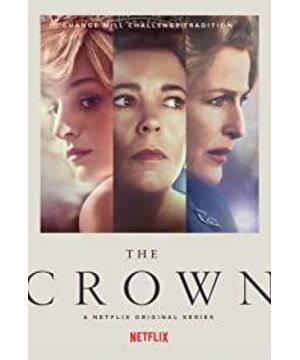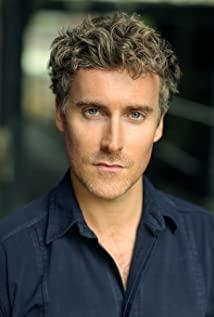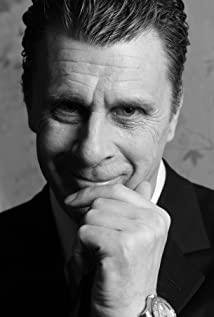Talker alert! Explosive code word!
1. Light and Shadow in "The Crown"
The Crown is a drama about the appearance of all beings, and it is also the drama with the largest pattern in the trilogy of the Queen's drama review series that I want to write. This drama conveys too many value orientations, and what I can get is only my purely subjective perspective. It not only respects and restores the sacred stalwart of the great figures of history beyond ordinary people, but also strives to make the aura of the great figures of history come to the ground through various approaches, and subtly excavates the level of human nature.
Queen Elizabeth II is the absolute heroine of the show, but not the absolute protagonist.
In the script of "The Crown", the screenwriter first respected history, and then created independently on this basis, not only letting all beings radiated by the crown radiate their own light, but also allowing the audience to see the shadows that accompany the light.
And because of this, I can see the power of the script of the ten-episode drama. It is full and solid, meticulously crafted, and the characters are portrayed in a multi-faceted and three-dimensional manner.
light
(1) The pure love of a noble princess
In my opinion Elizabeth's love for Philip was purer than Philip's for her.
Just because he is him, she can choose him and marry him simply because she loves him, regardless of whether the family behind him is declining or not.
The first episode is about Prince Philip, a well-known background that basically does not need science popularization. But there were also hints, such as Churchill shouting at the wedding that Philip's sister was married to a Nazi. In essence, he is a "homeless German", but this German is also an extraordinary forest bird. In history, he is both beautiful and prosperous and both internal and external.
Philip's love is obviously complicated. As a Greek prince who was born in exile in a foreign country, although the process of his acquaintance and love with Lilibet is as beautiful as a childhood sweetheart, he can also do it when he faces the threat of elephants in Africa. , regardless of his own safety to maintain Elizabeth's safety. But when his father-in-law died, he showed no grief. Instead, when he celebrated the victory of the "Mountbatten" surname with his family, he couldn't help but wonder whether the sweet love was also mixed with some trade-offs. The prince married the first in line to one of the most successful royal families in the world, and there was love and bread.
But it doesn't matter, at least in Elizabeth, who is still a princess, she sees her pursuit of pure love.
Elizabeth, who is dignified and gentle on the outside, clearly has a tenacity in her heart. This role has been overcome by her opinion on love and marriage, and her assertive attitude has gradually been established.
In this way, she is very pleasing. Even if she is the spokesperson of the ancient monarchy, even if she was born in a relatively conservative era, her concept of marriage and love is forward-looking and modern female thinking. Rome wasn't built in a day, and it was the brilliance of her character in these details that gave reason to believe that the royal family she led could find its place in the alternation of the old and new worlds.
(2) Ordinary fathers and great fathers
When I saw this scene, my heart was moved with an electric shock. It is such a passage that writes the dual images of an ordinary father and a great father and king. The screenwriting skills are really terrible. The father, who knows that his death is coming, is passing on the baton of protecting his daughter to his son-in-law with good intentions, and is painstakingly paving the way for his heir.
She is your duty, and loving her is patriotism. The weight of this sentence Philip may take a lifetime to grasp.
George VI in the play has all the virtues of a king, being loyal, filial, benevolent, and loving the country and family. It is conceivable that he took the throne halfway, in order to complete his mission, carry the banner of kingship, give up all his previous plans for life, and experience how much hardship he paid to become a real king from a mediocre prince who had no royal talent.
He is self-disciplined. In order to be a good king, he can only listen to dirty jokes to relieve his emotions, and even overcome his stuttering by smoking cigars and hurting himself, and eventually suffers from lung cancer.
For the audience, when he gets along with his daughter, he is like an ordinary father who is persuasive. He says that Elizabeth is his pride, Margaret is his joy, and his father's love is beyond words. He taught the sisters that brotherhood is above all else, and guided them to establish the correct three views.
But from Elizabeth's point of view, he was a great father by example. After Elizabeth became queen, every memory with her father was an imperial lesson.
When the former King Edward VIII used the kind of innate superiority to mention George VI that George VI was a weak brother, the response of the royal secretary made people applaud.
"The late king is not weak. I can express my opinion on behalf of everyone present. He is a hero." This is a heartfelt comment from a minister. The George VI portrayed in the play was not born to be a king, let alone the divine right of the monarch. The reason why he became a real king was entirely because of his bravery and responsibility. He stood up and maintained the dignity of the royal family with his words and deeds. And his spirit has always influenced Elizabeth.
(3) Interesting father of the nation
Although Anthony's sentence "Winston still thinks he is the father of the country" seems to be evaluating Churchill's arrogance, but through the portrayal of Churchill's tone throughout the first season, it is clear that he is the father of the country. Prime Ministers often have, but not often the Founding Fathers.
Because it is the history of other countries, before watching "The Crown" and "Dunkirk", I couldn't imagine the specific degree of Churchill's influence on the British in that era. After reading it, I actually said that he was British The spiritual leader of man is not exaggerated. In the United Kingdom after World War II, in addition to the king's strength to inspire people in wartime, there is the founding father of the United Kingdom. Perhaps the status of the two was equal in the hearts of the British people at that time.
Aside from the various actions of this historical celebrity towards China, it is still time to give a fair assessment of this charismatic big man. Just as even someone as politically wrong as Hitler has his brilliance, not to mention that he is not Hitler.
This highly responsible and capable prime minister should be thankful that the young queen met him, and he would be the best companion. I remember he sincerely said, "The party needs me, the country needs me, she needs me."
Of course he's not perfect, he's got the tricks and cunning of a politician, and he seems too shrewd to be kind. However, the proud stubbornness and intelligent flexibility of the British founding father kept him alive.
When the smog covered the whole of London, he made empirical mistakes and was obsessed with political games. Finally, after the female secretary died in a car accident on a smog day, he woke up like a dream, who worshiped him and kept beating him. When the original female fan died, he realized that his decision was wrong.
Watching him in just a few minutes, with his profound writing talent and outstanding speaking skills, gave a best case of crisis public relations, from being almost forced out of office by the Queen to turning the situation into a "true leader in crisis", The wit shown in this emergency is still admirable. Although he is still inseparable from the show and scheming of politicians, I believe that he sincerely regrets the dead female secretary fan like an idol.
The second time Churchill woke up in the play was because another of his fans, a painter, was ordered to paint a portrait of him. They even became best friends. But when he first unveiled the painting in parliament, he fought back his anger. After returning, he was even more ashamed and annoyed, because the self in his heart and the self in the painting were clearly two people. He even thought it was a betrayal of his friendship by the painter.
This painter is sincere, he ruthlessly exposes the fact that Churchill's hero is late, and reminds him to recognize the truth. True love fans are like this, even if the loyal words are against their ears, they must refuse flattery.
Churchill is so interesting. There is an old Chinese saying that "a prime minister can punt a boat in his stomach". Although this old man was arrogant and arrogant, he never lost the basic qualities of being a leader . He finally realized that it was time for him to abdicate and become a virtuous man. An aging body would not bring much benefit to the country.
So he calmly said goodbye to the queen like the younger generation he had truly taught, and always obeyed the etiquette. Even if his body was reluctant, he had to stand to meet the queen and maintain the attitude of a servant. For the first time, he ignored the etiquette and kissed the queen's forehead.
He also said goodbye to Anthony, who was both an enemy and a friend and loved each other. Even if there was an unpleasant experience, it was all over. There is no prime minister who does not want to do everything for the country and die. Although their personalities are different, their ideals are the same, and both of them are aware of this.
At the end of the ninth episode, with the Queen's tribute speech to him, the portrait of his inner refusal is burned. When he can face up to his own reality, why does he need a painting to remind him? The portrait was burned and smoked, symbolizing that his past glory was destined to become history.
The play also explained his life after he retired. This legendary figure reminded me of one of the founding fathers of the United States, Hamilton, as sung in the musical "Hamilton": "who lives who dies who tells your story?"
It is also given to the founding father of the United Kingdom. After thousands of years, who will be alive? Who will die? Who will sing your story?
movie
(4) The shattered fairy tale
If the story of the prince and the princess stops at the moment when the wedding vows, or at the moment of their honeymoon, or at the moment when they welcome the crystallization of love together, it will be a complete fairy tale.
But in the long years to come, the prince will gradually become a wronged husband, full of burdens and nowhere to show, while the princess bravely chooses to cultivate into a real queen. The direction of the story can't be a fairy tale.
I still remember the various chicken soup and anti-chicken soup articles written on the theme of this couple on the public account. In fact, no matter what kind of story it is, beautiful stories like "Queen and Guard" do exist, and scandals like "Prince of Flowers" cannot be buried. The reason why beauty and failure coexist is precisely because they, and even the royal family they represent, will not become the protagonists of fairy tales as the public expects.
The story of her and Philip seems to begin with a fairy tale, but it ends in a WTO marriage that ordinary people experience. Quarrel over differentiated viewpoints, fight over who holds the position of head of the family, struggle over how to get rid of the distorted positioning of the queen and the little white face.
If Philip was really willing to be the man behind the queen with no ambition, maybe the queen would not love him like a fan girl. As many media have written, "It is precisely because everyone looks up to her that Philip's ordinary lingering and entanglement towards her like an ordinary couple makes her cherish and love her more."
Flawed Philip is still a special being.
But this love, this marriage, is disillusioned and regretful compared to the word beautiful.
In the Middle Ages, it was a well-established tradition that queens could have male pets, but as a special queen who came to the throne with the recent revolutions blooming everywhere and the monarchy was crumbling, even in the face of her husband's derailment, she could not be like the rulers of the past. Indulge yourself like that.
What's more, this is a queen with a lofty sense of responsibility and a firm view of love. She must do her best to maintain the royal family and her self-esteem as a wife.
In the first season, the description of Philip's derailment is somewhat obscure, probably due to the fact that the real person is still alive.
Men and women are sometimes so unfair. Men have so many lovers that they can open clubs, but some women still choose to turn a blind eye, especially women who are in high positions and have scruples. The woman just appeared a pure and hurried childhood sweetheart, but it was enough to make the man jealous, and the woman could only eliminate the estrangement through a sincere confession.
The male protagonist under the light of the crown still has the inferiority that ordinary men may have. Elizabeth's remarks clearly made Philip ashamed. A single-minded woman can make a promiscuous man ashamed, on the one hand because her virtue shines, and on the other because Philip still loves Elizabeth, despite this. Share love with the shadow of physical derailment, the dim is no longer dazzling.
Philip is probably the one who proves that affection is not as good as a long-term companion! He was indeed not affectionate enough, but he also accompanied her from her teens to her 80s and 90s, and sacrificed all the dreams of her youth. Although the fairytale-like opening of this love was defeated and shattered by reality, he still never broke his vow of "holding the hand of the son and growing old with the son".
2. There is no divine right of the king, but someone has the courage to be the king
(1) The addition of divinity and the subtraction of human nature
Remember Churchill said to Elizabeth: "Don't let them see the real Elizabeth, don't let them see that the crown is also a burden, let them look at you, but only see the immortality of the crown."
Reminds me of Churchill saying to Margaret, "Royalty, they want to see this, not you."
Kingship is sacred and divine, and your color as a person no longer matters.
So it doesn't matter whether the Queen's smile comes from her heart. She even smirked until her face cramped to the point where she had to be injected for treatment. The waving of her hands could be done at a frequency like a machine. More and more like a lucky cat, a mascot.
This is because, with the crown, divinity is doing addition, while human nature is constantly subtracting.
"Why can't we watch the most sacred moment, because we are mortals." Protoss has something to lose, and mortals have something to gain. You see, God's chosen spokesperson is no happier than everyone sitting here.
Maybe at that moment someone envied the girl under the light of the crown, but most people only limited it to that moment, with a curious motive and a little yearning for the kingship.
Accepting the false proposition "I am not a mortal" is clearly a matter of great courage.
(2) There is no such thing as divine empowerment, but someone has the courage to be king
It can be seen from the performance of this drama that to become a queen is by no means as simple as casting a good baby or playing some tricks granted by the monarch.
The real queen is not a puppet doll who bears the weight of the crown, but a brave man who constantly cultivates his heart and strengthens himself. There is no such thing as divine authority, but there are people who dare to be kings.
This brave modern queen, like most modern women, needs to go beyond most powerful women in her career and handle high-level international affairs. At other times, like career women, she also needs Thinking about how to balance family and career will also need to face the crisis of marriage and family relationship, and it will also be a headache for parents like ordinary people. In the next few seasons, they will also face the problem of the century, that is, the problem of mother-in-law and daughter-in-law Diana.
And these, if you don't have a brave heart and a mentality to face difficulties, it is difficult to make yourself have the strength to persevere. It is not easy to be born as a human being, let alone to be born as a king.
Edward VIII was not brave, so she became a former king who was unable to return to her homeland, but she was brave, so she became Queen Elizabeth II, who was known for her long standby time.
In fact, for a modern queen, admitting defeat is the greatest bravery! Acknowledging that he lost to the kingship, in front of the kingship, "self" is always second, and there should not even be one thing.
And this bravery lies in the fact that in order to hand over victory to the kingship, one must quietly and step by step in the long role-playing career of the queen, and finally, there is no room for burying the "self" and magically create for oneself An extraordinary life, a life as a queen.
In the West, which advocates individualism, this is a very difficult phenomenon. Seeing her subjects hold high the banner of "freeing themselves", she had to calmly express her appreciation, and at the same time, together with her royal family, put away the wings of wanting to revel together.
And Wanmin's spying has become a living example of history, and it is also the indemnity she lost to the royal power.
After a white horse, the lady of the Navy, Elizabeth Mountbatten, who danced with her friends at the Party, slowly turned into a yellowed history with Elizabeth's courage to become king, even though that lady of the Navy was Elizabeth herself.
This is Elizabeth in the play as I understand it through the screenwriter's characterization. In fact, I personally, whether in the play or in reality, envy the queen, but in fact it is just one reason to envy her for being rich. Compared to envy her, the attitude of admiration and respect is more appropriate.
And this appreciation and respect is the attitude of the screenwriter of this drama to the heroine. Because she admires her and respects her, all the plots about her are to guide the audience to look at her in a positive way. This is how a screenwriter portrays a woman. What the protagonist should do. Only when the screenwriter really cherishes the character can the audience truly appreciate the charm of the character.
From "The Lord of the Crown, Who Can I Give You" to "Now there is only Queen Elizabeth", the lines always make the plot that is obviously not so tragic, with a sense of tragic and solemnity, and the audience also feels inexplicably sad, probably because No one wants to lose their true self.
In fact, the pain of losing a king can only be temporarily remembered in the heart, and the pain of losing oneself is something a queen will never forget in her life!
View more about The Crown reviews











